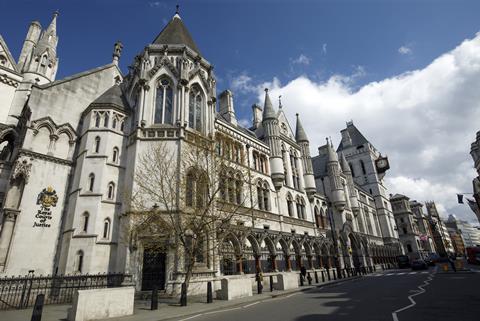A court that deals with fundamental questions of human autonomy is becoming less risk-averse despite being thrust into the public eye. Melanie Newman reports
The low down
Contact, care and residence arrangements were once the Court of Protection’s bread and butter. But the COP’s remit – to decide questions balancing human autonomy with capacity and risk – has grown to encompass cases involving sex, gender and sexuality. Meanwhile, its life and death decisions on medical treatments have been subject to close scrutiny and campaigns against controversial judgments. All this has coincided with increased transparency for the COP which, subject to strict reporting restrictions, has been open to observers and the media since 2016.
From decisions about withdrawal of liquids from someone in a vegetative state to questions over where and how a person lives, the Court of Protection’s ambit is wide. And its rulings on welfare and financial matters for people who lack capacity are controversial, leading to its decisions on sex, capacity and care arrangements regularly hitting the headlines.
Two recent COP judgments involving arguments about the rights of men with learning disabilities to have consensual sex with women received widespread criticism.
In the first case, which was concluded last April, Mr Justice Hayden ruled that a carer would not breach the Sexual Offences Act by supporting a man, C, to contact, visit and pay a prostitute. The judge also decided that preventing the carer from doing so would unjustifiably interfere with C’s human right to a private life – including sexual contact.
The Centre for Women’s Justice, led by solicitor Harriet Wistrich, intervened in the appeal on behalf of two women’s rights organisations. The centre said there was a strong possibility any prostitute C visited would have been exploited, meaning C and his carers would be at risk of committing the strict liability offence of paying for the services of an exploited woman.
Setting aside the COP decision, one appeal judge agreed with the centre while all three justices ruled that the carer would risk committing a different offence: that of causing or inciting a person with a ‘mental disorder’ they are caring for to engage in sexual activity.
They also confirmed that there is no evidence in case law of ‘a human right to purchase the services of the prostitute or to be provided with such services by the state’.
The case followed an equally controversial 2019 COP decision on whether JB, a man with learning difficulties who did not understand the need for a sexual partner to give their consent, had the capacity to consent to sex himself. JB’s doctor felt there was a risk of JB raping a woman and that ‘the severity of the assault was likely to increase with the vulnerability of the woman concerned, but that JB may also severely assault less vulnerable women whose intentions he has misunderstood’.
Sitting in the COP, Mrs Justice Roberts decided that requiring the man to demonstrate an understanding of his sexual partner’s initial and ongoing consent would be discriminatory as it was a ‘burden which a capacitous individual may not share and may well be unlikely to discharge’ and that JB was ‘entitled to make the same mistakes which all human beings can’.
The Court of Appeal disagreed – the Centre for Women’s Justice having intervened in this case too – and its position was upheld by the Supreme Court in 2021. Lord Justice Stephens said the COP and Mental Capacity Act 2005 do ‘not exist in a vacuum, but are part of a wider system of law and justice’.
‘The COP should have regard to reasonably foreseeable adverse consequences, with the aim of protecting members of the public as well as persons who may lack capacity,’ he said.
'There’s an understanding [by the Court of Protection] that, on some occasions, a risky choice is still the least worst choice'
Caroline Hurst, Simpson Millar
Both cases may be seen through a prism of ‘competing rights that require equal consideration’, Wistrich tells the Gazette. ‘The rights of women to be protected from sexual assault and exploitation had to be balanced against the rights of the men.’ Both cases were complex and difficult, she adds.
The cases of C and JB could also be seen as part of a general trend towards a more liberal court, reflecting society’s greater focus on individual sexual rights.
Kate Jackson, solicitor and director of Leeds firm MJC Law, says that in the COP’s early days there were relatively few cases that did not focus on contact, and care and residence arrangements. Now sex and sexuality are fairly common features.
‘I wonder whether, as the years have gone by, the social mind has become more liberal and accepting of alternative ways of living,’ she says. Jackson is aware of cases involving young gay men seeking to meet other men for ‘brief engagements’ in public places, for example, and others wanting to attend bars and nightclubs. ‘There is increased awareness among support staff and social staff, so that when these questions arise they are brought out and dealt with rather than being shut down and considered inappropriate.’
Caroline Hurst, a senior associate with Simpson Millar in Manchester, says as the COP has grown it has become less risk-averse: ‘There’s an understanding that, on some occasions, a risky choice is still the least worst choice. There is less and less “cotton wool”.’
'The weight that is attached to P’s views has changed and there’s certainly more willingness to try to accommodate what P wants than has been the case'
Kate Jackson, MJC Law
She points to a 2020 COP ruling on a person’s capacity to engage in autoerotic asphyxiation in A Local Authority v AA EWCOP 66, setting out the relevant information that a person must understand and weigh up in order to make a capacitous decision about this dangerous practice.
Hurst also expects to see more cases involving transgender clients unhappy at being placed with people of the same birth sex, or refusing to engage with support workers for the same reason.
‘The weight that is attached to P’s views has changed and there’s certainly more willingness to try to accommodate what P wants than has been the case,’ Jackson explains. Previously, the COP refused to allow elderly people at the end of their lives to leave residential care and return to their homes as it was not safe, she says. ‘Now the court is much more likely to try to achieve that.’
This legal landscape of risk carefully balanced with P’s wishes and preferences can seem starkly at odds with public bodies’ attitudes in other cases. Kirsty Stuart, an associate at Irwin Mitchell, recalls that one of her clients, a young woman, had been classified as lacking capacity in 10 different domains.
‘She had a very restrictive 1:1 care package and was desperately unhappy,’ Stuart says. ‘I thought it didn’t sound right, so we got an independent report done. She was found to have capacity in every domain and went home.’
Property and financial decisions
The Court of Protection may appoint a deputy to deal with the property and financial affairs of a person who lacks mental capacity. Deputies can be family members or friends of the person involved, or independent professionals such as solicitors. Some firms are members of a panel of deputies compiled by the Office of the Public Guardian.
Jane Netting is a partner at Wrigleys in Sheffield, which is currently on the panel. She says she’s seen a shift in the types of cases reaching her firm in the last few years.
‘Previously most of our cases tended to involve an elderly person with no next of kin whose house needed to be sold to pay for their care,’ she says. ‘Now we’re dealing with misappropriation of funds – an attorney or deputy has mismanaged the money or had their hands in the till.’ Her team has now developed closer links with local police and anti-fraud teams in banks. The reason for this shift is unclear. ‘It may be that more people know to report to the Office of the Public Guardian, or that banks are more aware than they used to be,’ she says.

While Netting agrees with the decision, she fears large numbers of requests for authorisation have increased pressure on a court system that is already creaking at the seams.
‘I have an application where the existing deputy is finding things very difficult and wants to step down, and that’s been at court nearly a year,’ she says.
The Court of Protection Practitioners Association echoes her concerns. CoPPA’s co-chair, Mathieu Culverhouse of Irwin Mitchell, tells the Gazette the association hoped electronic applications would ease the pressure. An e-application pilot run in a handful of firms is due to end this month, and while users are hoping to extend and expand on it, the scheme’s future is uncertain.
Another of Stuart’s cases involved a 30-year-old man, ‘RB’, who had metastatic testicular cancer. Newcastle upon Tyne Hospitals NHS Foundation Trust had refused him chemotherapy, which offered a better than 95% chance of a cure, because it felt administering the drugs would be too challenging for RB.
Just before Christmas 2020, the trust told RB’s parents their son would die within a year. There were ‘no treatment options’ it said, advising them that ‘comfort measures would be most appropriate, as going ahead with treatment would limit [RB’s] quality of life’.
Thanks to social media, RB’s mother learned about Ian Shaw, another young man with learning disabilities, who had been denied treatment for testicular cancer by Bedfordshire Hospitals NHS Foundation Trust. The trust said its decision was due to Shaw’s condition deteriorating and was not influenced by his learning disabilities. However, after psychiatrist Dr Justin Wilson heard Shaw’s story on BBC News, he urged the Shaw family to seek a second opinion. Following that, Shaw received chemotherapy.
RB’s mother contacted Shaw’s family and Stuart, who asked Newcastle upon Tyne NHS Trust to do a capacity assessment for RB. Following this, the trust decided RB could be treated, but then turned to the COP to decide what sort of chemotherapy treatment he should have after his mother expressed doubts about the trust’s plan.
Doctors argued RB should not have the standard, most effective treatment, which required prolonged intravenous infusions, but a less effective form which could be more easily delivered to him and omitted one drug that posed an extra risk due to Covid-19. RB’s mother wanted other options to be explored more, including a proposal from a doctor involved in Shaw’s case. In the end, RB’s mother agreed with the trust’s plan.
‘[RB] had treatment and is in remission,’ Stuart says. ‘His mother and I are still in touch and he’s doing fine.’
RB’s case was covered in the Open Justice Court of Protection Project blog and Twitter account by Celia Kitzinger, an academic and transparency campaigner. Kitzinger and fellow academic Gill Loomes-Quinn founded the project in 2016 to encourage and assist the media and public to observe proceedings in the COP.
Opening up
In 2016, in response to media pressure and following a six-month pilot, the COP became an open court. Strict restrictions on what could be reported in the media continued, including rules imposed as standard preventing the identification of individuals and families subject to proceedings, but journalists were now able to attend and report on hearings.
Stuart, one of the volunteers who form the Open Justice Project’s team, says there has been a ‘massive shift’ in terms of transparency in the COP, and that judges and lawyers have changed their behaviour accordingly.
‘If we know there’s someone observing, we won’t say “a Section 49 report”, we’ll say “a report for the purpose of…”. We try to make things clearer,’ she says. Today, cases are routinely opened with summaries highlighting case histories.
Kitzinger says the presence of observers has also resulted in judges being less dismissive, an attitude that was reported by parents who attended observed and unobserved hearings.
But as the Open Justice Project’s blog shows, reporting on the COP can still be difficult. One observer describes their abortive attempt to access a January hearing before Mr Justice Hayden.
‘I had no response and continued to contact the court by phone, but to no avail, until Celia Kitzinger came to my aid and emailed the judge’s clerk directly on my behalf.’ The observer was then sent login details to the remote hearing but could not access it, as the hearing had been incorrectly listed and was only open for in-person observation.
The next day, she managed to access an online hearing, only for the judge to ask her to leave it as she had only applied for access the night before. Next, she successfully joined a telephone conference hearing about a Deprivation of Liberty Safeguards (DoLS) application before Her Honour Judge Hilder, the court’s senior judge.
‘Judge Hilder politely declined to send me the transparency order and made it clear that the contents of the hearing could not be published,’ the observer wrote.
This observer’s experiences suggest transparency at the COP is still a work in progress, but one recent case indicates it may be moving in the direction of even more openness.

In November, the COP hit headlines when the BBC and Sky News applied to lift reporting restrictions in the case of Tony Hickmott. For more than 20 years Hickmott, a 44-year-old man who has autism, has been detained in a hospital more than 100 miles away from his parents, who are fighting to bring him closer to their home. Although Hickmott had been judged fit for discharge in 2013, Brighton & Hove Council and the local clinical commissioning group had failed to identify suitable alternative accommodation.
The COP imposed a reporting restriction order – its standard approach – when proceedings started in 2019, banning the publication of information that could identify Hickmott.
The BBC and Sky successfully argued that the ban was a disproportionate restriction on the media and parental right to freedom of expression. They pointed out there was already so much material in the public domain about Hickmott that any reporting on the case would risk his name being disclosed via jigsaw identification, so the order effectively forbade all reporting.
Ravinder Brar, solicitor and director of RKB Law in Maidstone, acted pro bono for Hickmott’s parents. She expects there will be more cases where the COP will be asked to oversee the discharge, as it did for Hickmott.
‘I certainly think that there will be more applications to lift reporting restrictions,’ she adds.
Brar points out that Hickmott’s case was also unusual because since proceedings began in 2019, the COP has taken a role in tackling the lack of progress in finding alternative accommodation for him.
Each month the local authority and clinical commissioning group with responsibility for Hickmott’s care and residence are required to update the court on progress with his discharge plan. ‘I suspect there are a number of cases where, due to lack of identification of options for P by the statutory bodies, P cannot be discharged,’ she says. ‘And I do expect there may be more requests for the court to step up in its role.’
Stuart, who specialises in cases of people detained in secure ‘assessment units’ and hospitals, says the COP appears to be eager to sort these cases out.
‘There’s been a shift in the last year and a half where cases are accepted earlier and more quickly,’ she says. She has also noticed a shift in terms of what the court will explore, and increased flexibility in its approach. For example, it was not previously possible to apply to the COP in relation to a person who had been sectioned in a hospital under the Mental Health Act until there was a property address for the order authorising the deprivation of liberty.
‘This meant if people didn’t have homes to go to they could be in hospital for years and years,’ she explains. ‘That’s no longer a blocker.’

Melanie Newman is a freelance journalist
































No comments yet